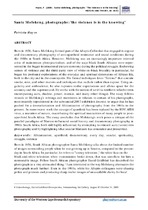Santu Mofokeng, photographs: 'the violence is in the knowing'
Abstract
Born in 1956, Santu Mofokeng formed part of the Afrapix Collective that engaged in exposé
and documentary photography of anti-apartheid resistance and social conditions during
the 1980s in South Africa. However, Mofokeng was an increasingly important internal
critic of mainstream photojournalism, and of the ways black South Africans were represented
in the bigger international picture economy during the political struggle. Eschewing
scenes of violence and the third-party view of white-on-black brutality in particular, he
began his profound explorations of the everyday and spiritual dimensions of African life,
both in the city and in the countryside. His formal techniques favor “fictions” that contain
smoke, mist, and other matters and techniques that occlude rather than expose. Using angularity
and ambivalence, he also ruptures realist expectations and allows space for the
uncanny and the supernatural. He works with the notion of seriti (a northern seSotho term
encompassing aura, shadow, power, essence, and many other things). The essay follows
strands in Mofokeng’s writings and statements in relation to certain of his photographs,
most recently repositioned in the substantial 2007 exhibition Invoice, to argue that he has
pushed for a desecularization and Africanization of photography from the 1980s to the
present. In more recent work the scourge of apartheid has been replaced by the HIV/AIDS
virus, a mutation of nature, exacerbating the spiritual insecurities of many people in postapartheid
South Africa. The essay concludes that Mofokeng’s work poses a critique of the
parallel paradigms of Marxist-influenced social history and documentary photography in
1980s South Africa, both still highly influential, by attempting to reinsert aura (seriti) into
photography and by highlighting what secular Marxism has concealed and proscribed.

